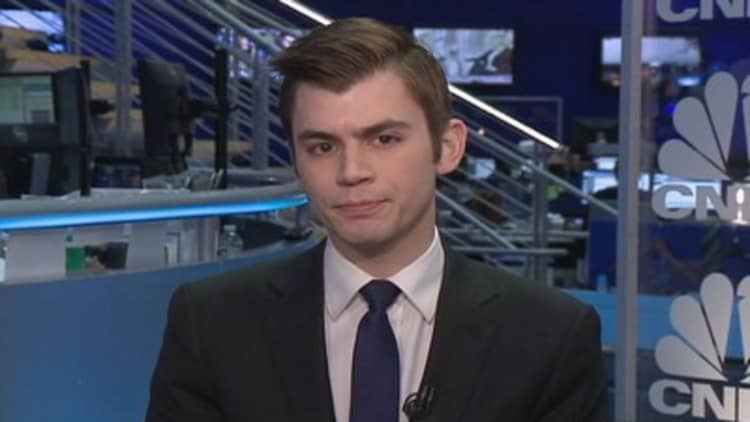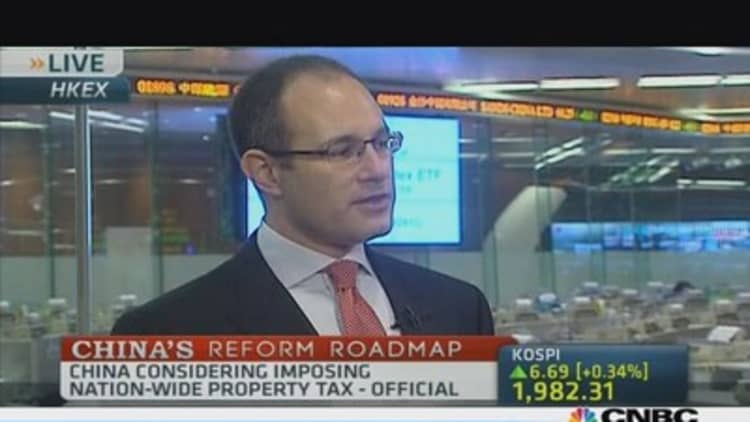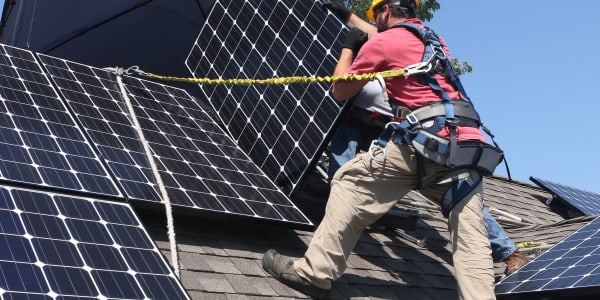
China's government declared a yearly economic growth target of 7.5 percent at the beginning of its annual congressional session this month, the same percentage that it set and narrowly cleared in 2013, according to official government data.
A potentially troublesome variable in this economic growth equation, however, is China's real estate sector, which represented 15 percent of the nation's GDP last year, according to China's National Bureau of Statistics.
The sector has been a pillar of growth for the nation's evolving economy and a growing source of bubble concerns, with relentlessly rising prices and widely reported overdevelopment—most dramatically illustrated by "ghost cities" that at have been built with government backing, only to sit virtually empty after completion.
At the National People's Congress this month, Premier Li Keqiang addressed the real estate concerns of China's top officials, reporting that the government would "curb demand for housing for speculation and investment purposes."
In another report released this month, China's National Development and Reform Commission acknowledged that "housing prices in some large cities are rising too fast, and there are risks and hidden dangers in the real estate market."
China's Ministry of Finance also announced that it would accelerate legislation for a real estate tax that would discourage individuals from speculating in the property market through multiple home purchases.
"They don't want to see a crash, and they don't want to see it too hot," said Alan Jin, a property analyst at Mizuho Securities. "They try to strike a balance."
Steve Collins, a president of capital market research at Jones Lang LaSalle, isn't so sure that the balancing act will be successful.
"Right now they're trying to take a little bit of the air out of the bubble," he said. "At one point, it will pop."
'Selling en masse'
"If the value of their real estate doesn't appreciate anymore, they're going to start selling their assets," said Collins of Chinese real estate investors. "They're going to start selling en masse, and that means that prices will go down. It has a better chance of happening than not."
Feiqin Duan, vice president of China Merchant Securities' international department, said that while prices may drop, he doesn't see any bubbles bursting, at least in the near term.
"If prices go down, many people will see that as a signal to buy," said Duan. "I don't think the real estate market will crash today or this year."
Kim Wright, a Hong Kong-based property strategist at UBS, is forecasting a slowdown in growth rather than a drop in price.
"Things will slow, but they won't collapse," Wright said. "We expect sales to slow to single-digit growth, and price growth to be between 0 and 5 percent."
Any slowdown can be partly attributed to banks trying to curb speculative buying by limiting loans for second home purchases to 30 percent of the home's value, or by eliminating second-home loans altogether, said Graham Zink, a Shanghai-based managing director at property consultancy Knight Frank.
Limiting multiple-home purchases is only one piece of the puzzle, however. Another issue is a polarization in the market caused by dramatic wealth disparity.
"Most houses built since 1998 have been bought by the top 10 percent earners," said Mizuho's Jin, referring to the year China implemented sweeping real estate market reforms. "There has been an outcry from the general public, because they cannot afford to buy a house."

To address this issue, China's premier announced plans for the completion of 4.8 million units of government-subsidized housing by the end of this year. Government intervention like that is one of the reasons Zink predicts China will avoid a hard landing in the real estate sector.
"The government will closely look at the conditions, and avoid a hard landing with various regulatory policies," said Zink. "Prices will slowly stabilize due to the effect of the various regulatory policies and gradual increase in supply."
Ryan Li, a China and Hong Kong property analyst at JPMorgan, largely agreed with Zink's assessment.
"In terms of sales volume, the official estimate is to stay flat for 2014. In terms of housing starts, they are expected to grow by 2 percent," said Li. "In the longer term, the whole market will trend to stabilization."
—By CNBC's Adam Molon. Follow him on Twitter @CNBCMolon.






